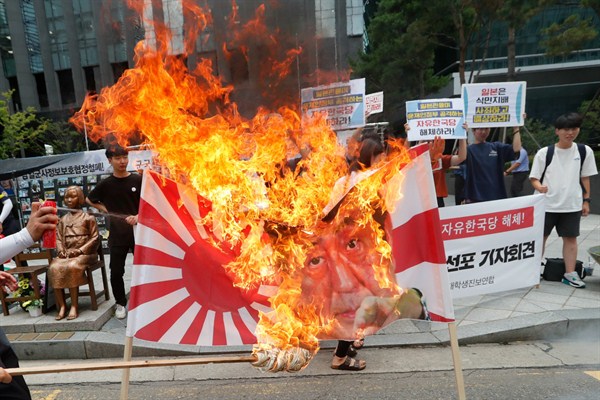Japan and South Korea are in the midst of a nasty diplomatic dispute, and Japan is using trade restrictions as a weapon to try and resolve it. Beyond the potential threats to American and regional geopolitical interests if the two countries remain at loggerheads, the nature of the spat is also disturbing. Japan’s use of trade restrictions to force South Korea to back down, while publicly justifying them as necessary for national security reasons, echoes U.S. President Donald Trump’s cavalier approach to trade rules and alliance relations. If the dispute is not resolved quickly, it could complicate efforts to deal with North Korea as well as other regional threats, while also dealing another blow to the World Trade Organization and the rules-based trading system.
Seoul and Tokyo are key U.S. allies in the Pacific region, but their relations have long been strained by the legacy of Japan’s colonial rule over the Korean Peninsula from 1910 until 1945. Japanese companies forced many Koreans to work for little or no pay and, during World War II, the Japanese military forced Korean women into sexual slavery. Japan insists that all war debts and reparation claims were settled under an agreement with South Korea, signed when the two countries normalized diplomatic relations in 1965. But the money provided by the Japanese government was part of a package of economic aid for the government in Seoul. The South Korean president at the time, Park Chung-hee, used most of the money for economic development and not to compensate individuals. Many South Koreans believe that Japan has never accepted full responsibility for its actions and that it should pay compensation directly to the victims of its human rights abuses or their descendants.
The current dispute erupted after South Korea’s Supreme Court upheld an appellate court ruling giving private citizens the right to sue Japanese companies for reparations over their forced labor claims. Japan protested, saying that all such claims were settled by the 1965 agreement. Tokyo tried to invoke an arbitration clause in the agreement, but South Korea refused. After the Japanese government told the affected companies not to make reparation payments, the plaintiffs’ lawyers launched an action to seize the companies’ South Korea-based assets.
On July 4, Japan announced that it was restricting exports to South Korea of key industrial materials—fluorinated polyimide, hydrogen fluoride and photoresists—that are essential for the production of semiconductors and display panels for smartphones and televisions. Japanese producers of those materials will now need a license to export them to South Korea, which could cause delays and disrupt operations even if the Japanese authorities eventually allow the exports to proceed.

